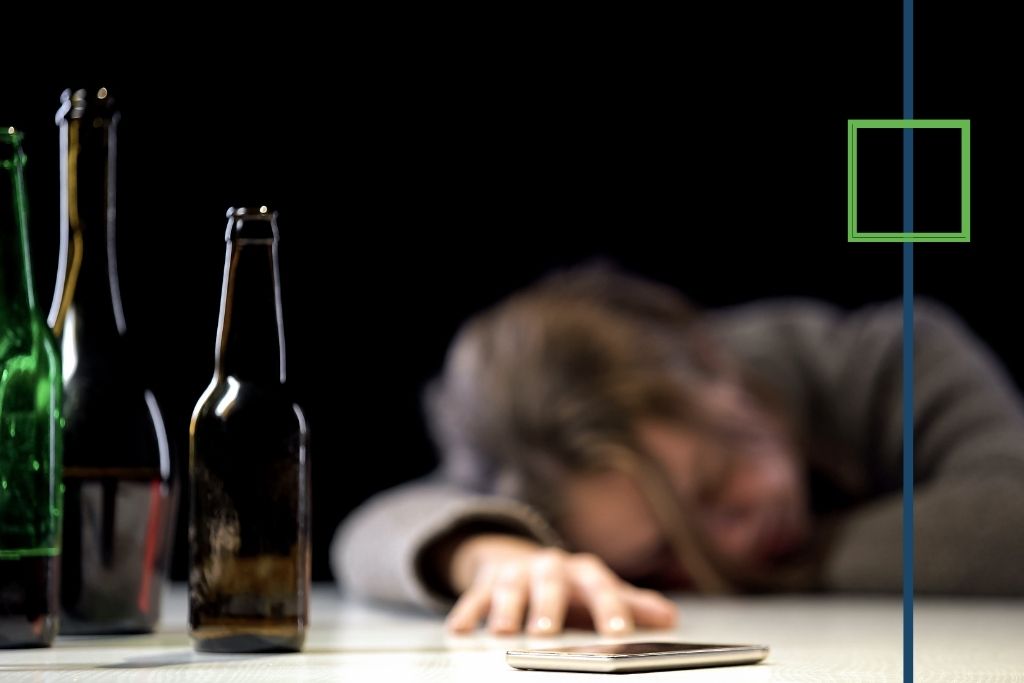What Is PTSD And Addiction Correlation?
There’s reason to consider a causal relationship between many mental disorders and substance use disorders. For instance, according to a study published on substance use among veterans, 11 % of veterans who visited a VA treatment facility for the first time matched the criteria for a substance use disorder. Veterans are also more inclined to suffer from mental illnesses such as post-traumatic stress disorder (PTSD), leading to alcohol abuse and opioid prescriptions that lead to substance abuse. On this page, you’ll learn more about the powerful connection between PTSD and addiction.
A summary published by the National Institute on Drug Abuse implied that there is a reason why people with mental disorders are up to two times possible to develop substance use disorders:
- Certain drugs can cause abusers to suffer one or more symptoms of another mental disorder.
- Mental disorders may accelerate or hasten substance abuse. An individual struggling from symptoms of a mental disorder may endeavor to self-medicate.
- Drug use disorders and mental illnesses are caused by overlapping determinants: genetic, deficits, and otherwise.
People who suffer from mental health disorders seek clinical medication or self-medicate with drugs or alcohol. And then, people who get prescriptions for their condition are less prone to develop substance use disorders (SUD). Still, often the medications they get access to have high abuse potential, generating more risk.
The reverse order can also happen, in which a mental disorder is caused or worsened by the use of drugs or alcohol. For instance, some common pairings:
- A study found that cocaine use can cause paranoia and anxiety
- Alcohol and antisocial personality disorder
- PTSD and opioid abuse


Get Your Life Back
Find Hope & Recovery. Get Safe Comfortable Detox, Addiction Rehab & Mental Health Dual Diagnosis High-Quality Care at the We Level Up Treatment Centers Network.
Hotline (877) 378-4154PTSD “Post Traumatic Stress Disorder”
PTSD is a condition caused by a traumatic event or period in one’s life. As the name refers, (post-traumatic stress disorder) fits of stress come, often triggered by stimuli correlated to their trauma, producing a surge of emotions and unpleasant memories linked with the event. PTSD patients report that they seldom suffer from insurgent anxiety, sleepless nights, and unrealistic dreams, such as nightmares, by nature. This can lead to short-term memory loss, which may cause long-lasting psychological issues.
It is highly advisable to treat those having undergone a traumatic encounter as early as possible to avoid complications. When it is proved that the affected person is behaving dangerously, it is crucial to address the issue so the traumatic event will no longer impact the sufferer. To deal with the rounds of stress brought on by PTSD, many individuals start self-medicating with depressants to numb their pain or any other drug that enables them to find an ‘escape’ from their experiences.
Signs & Symptoms of Post-Traumatic Stress Disorder (PTSD)
PTSD indications are commonly grouped into four types: Intrusion, avoidance, negative changes in thinking and mood, and changes in physical and emotional reactions. Symptoms can differ over time or vary from person to person.
Intrusion
Intrusive thoughts such as repeated, involuntary memories; distressing dreams such as nightmares; or flashbacks of the traumatic event. Flashbacks may be so vivid that people feel they are re-living the traumatic event or seeing it before their eyes.
Get Help. Get Better. Get Your Life Back.
Searching for Accredited Drug & Alcohol Rehab Centers Near You? Or Mental Health Support?
Even if you have failed previously, relapsed, or are in a difficult crisis, we stand ready to support you. Our trusted behavioral health specialists will not give up on you. Call us when you feel ready or want someone to speak to about therapy alternatives to change your life. Even if we cannot assist you, we will lead you wherever you can get support. There is no obligation. Call our hotline today.
FREE Addiction Hotline – Call 24/7Avoidance
Avoiding reminders of the traumatic experience may include avoiding people, places, activities, objects, and conditions that may trigger distressing memories. People may attempt to avoid remembering or thinking about the traumatic event. They may oppose or despise talking about what occurred or how they feel about it.
Adverse Changes In Thinking And Mood, And Changes In Physical And Emotional Reactions [2] May Include:
- Negative thoughts about yourself, other people, or the world
- Feeling disconnected from family and friends
- Difficulty feeling positive emotions
- Hopelessness about the future
- Memory problems, including not remembering relevant aspects of the traumatic event
- Difficulty keeping close relationships
- Feeling emotionally numb
- Lack of interest in activities you once enjoyed
- Self-destructive behavior, such as drinking too much or driving too fast
- Difficulty sleeping
- Being easily startled or frightened
- Always being on guard for danger
- Overwhelming guilt or shame
- Trouble focusing
- Irritability, angry outbursts, or aggressive behavior
Risk Factors Of PTSD And Addiction After A Traumatic Event

Risk Factors Of PTSD After A Traumatic Event Include:
- Genetics mental health problems, including anxiety or depression
- Having other mental health problems, such as anxiety or depression
- Having problems with substance misuse, such as excess drinking or drug use
- Lacking a sound support system of family and friends
- Having a job that doubles your risk of being exposed to traumatic experiences, such as military personnel and first responders
- Experiencing extreme or long-lasting trauma
- Having undergone other trauma earlier in life, such as childhood abuse
Comfortable Facilities & Amenities
High-Quality Addiction & Mental Health Rehabilitation Treatment
Rehab Centers TourRenowned Addiction Centers. Serene Private Facilities. Inpatient rehab programs vary.
Addiction Helpline (877) 378-4154Proven recovery success experience, backed by a Team w/ History of:
15+
Years of Unified Experience
100s
5-Star Reviews Across Our Centers
10K
Recovery Success Stories Across Our Network
- Low Patient to Therapist Ratio
- Onsite Medical Detox Center
- Comprehensive Dual-Diagnosis Treatment
- Complimentary Family & Alumni Programs
- Coaching, Recovery & Personal Development Events
Addiction “Substance Use Disorder”
The original development of addiction may have come about as a response to a mental health issue. Unfortunately, without proper diagnosis, many endeavors to control their disorders by self-medicating—alcohol or tranquilizers for anxiety, amphetamines or cocaine for depression, etc.—and the short-term comfort or diversion make the experiment look like a success.
The unhealthy routine can lead to dependency, and a substance use disorder is set when one beforehand might not have been. In addition, substance abuse can worsen mental illness, And mental illness can hinder long-term sobriety. This cyclical impact of dual diagnosis (co-occurring disorder) makes it complicated to treat without the proper support.
Treatment For PTSD And Addiction
Addiction, once fully developed, becomes a dangerous disease in the brain. But if we view it as a symptom, we can trace it back to its origin. Substance abuse may have started as a remedy for esteem issues, improving social status, or stemmed from a need to self-medicate due to previous burdens or trauma. These root causes are precise, like past events trauma, but some may have to do with a pre-existing chemical imbalance.
Many mental disorders, like addiction, are better treated when you fully understand what you are suffering from. Likewise, like diabetes, one must familiarize themselves with its causes, symptoms & conditions for safely living with the disease. Understanding PTSD, depression, other disorders and their effects on you goes a long way to knowing your own treatment needs.
World-class, Accredited, 5-Star Reviewed, Effective Addiction & Mental Health Programs. Complete Behavioral Health Inpatient Rehab, Detox plus Co-occuring Disorders Therapy.
CALL (877) 378-4154End the Addiction Pain. End the Emotional Rollercoaster. Get Your Life Back. Start Drug, Alcohol & Dual Diagnosis Mental Health Treatment Now. Get Free No-obligation Guidance by Substance Abuse Specialists Who Understand Addiction & Mental Health Recovery & Know How to Help.
Start Your Treatment At We Level Up New Jersey For PTSD And Addiction
Patients with PTSD and SUD can stand and benefit from evidence-based trauma-focused PTSD treatment such as Prolonged Exposure (PE) and Cognitive Processing Therapy (CPT). [3] There’s a lot of behavioral therapies that approach the connection between PTSD and addiction if you will seek professional help prepared and accredited for dual diagnosis.
As the addiction treatment community recognizes that addiction is a mental disorder, the relationship between substance use and mental disorders becomes more complicated. Unfortunately, the more excellent treatment community largely lacks a proper understanding of dually diagnosed conditions, so these conditions are still treated separately, or worse–not treated or diagnosed at all.

Our dual diagnosis treatment center in New Jersey is one facility that has professionals equipped and qualified to help treat co-occurring disorders concurrently. This type of tandem treatment provides some of the best success rates.
Get treatment for individuals struggling with substance abuse and mental health disorders, such as PTSD and addiction. Contact us today here at We Level Up New Jersey!
Experience Transformative Recovery at the We Level Up Treatment Center.
See our authentic success stories. Get inspired. Get the help you deserve.



Start a New Life
Begin with a free call to an addiction & behavioral health treatment advisor. Learn more about our dual-diagnosis programs. The We Level Up treatment center network delivers various recovery programs at each treatment facility. Call to learn more.
- Personalized Care
- Caring Accountable Staff
- Comfortable Amenities
- Licensed & Accredited
- Renowned w/ 5-Star Reviews
We’ll Call You
Sources:
[1] Mental Health and Substance Use Disorders – Substance Abuse and Mental Health Service Administration
[2] PTSD and Addiction Treatment – We Level Up
[3] Treatment of Co-Occurring PTSD and Addiction in VA – U.S. Department of Veterans Affairs